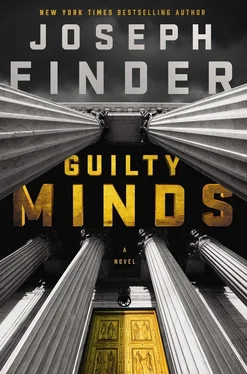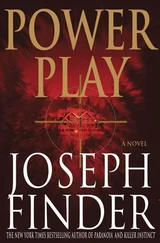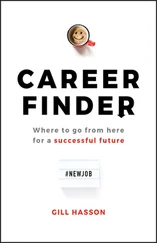“Thank God. And thank you.” His chin tipped up ever so slightly. “It’s time we paid Slander Sheet a visit.”
“Not you,” I said.
“Not me? And why the hell not?”
“It paints a big target on your back. Draws their attention to you. I think you should remain behind the scenes and let me be the up-front guy. The flak catcher. That’s what you pay me for.”
After a long moment of silence he said, “You’re right.”
On my phone I forwarded the call records to Dorothy — I was surprised at how big the file was — and then spent ten minutes with Gideon as he suggested to me some legal language to use with Slander Sheet.
When I got back to the conference room, Dorothy got up and threw her arms around me. I couldn’t remember the last time she’d done that.
“You did it,” she said.
“We can celebrate when Slander Sheet issues a retraction. Why is the file so big?”
“It’s a whole lot of data. A lot of the time she was using a navigation app on her phone that kept pinging the cell towers. Communicating, broadcasting nonstop. So the data is almost continuous, back-to-back. We can see where she went for hours at a time. Showing an almost perfect path of travel.”
“And where’d she go?”
“When she arrived in Jackson, she traveled from the airport to a Budget Rent a Car agency on the airport grounds. Then she drove about four miles to a town called Pearl, Mississippi, on the outskirts of Jackson. That’s where she spent most of her time. In the town of Pearl.”
“What’s there?”
“The Central Mississippi Correctional Facility.”
“Who’d she visit?”
She nodded. “I searched the Vinelink inmate locator under the name of Pitts, and I found a Raelyn Pitts, twenty-seven years old.”
“Her big sister.”
“Right. She was visiting her sister in prison. She stayed at a Comfort Inn near the prison both nights, June 6 and 7, and went to visit her sister twice.”
“You got all this from the latitude and the longitude of the cell towers?”
She shook her head. “They also give you street addresses. So I did some cross-referencing.”
“That just leaves one night unaccounted for. June 12.”
“Wrong. We got that, too.”
“How so?”
“They sent a month’s worth of call records, a full billing cycle. On June 12, she spent the evening at a sports bar in Arlington, Virginia, for most of the night. Never left Arlington.”
That meant that all three nights were accounted for. All three nights when she was supposedly with the chief justice she was provably somewhere else.
I called Slander Sheet and tried to get an appointment with the founder and editor in chief, Julian Gunn. I was told he was tied up. But once they heard I represented Gideon Parnell, Gunn freed up some time. He probably wanted to dance a victory jig in front of me.
I felt good. We had evidence that was rock solid, even better than I’d expected to come up with.
But there was something about this case that still bothered me, that had begun to nag at me, and I couldn’t quite put my finger on it.
In the hour before my meeting with Julian Gunn, I got on the phone while Dorothy combed the Internet, and fairly quickly I had a decent working profile of the guy.
He was British, graduated from Cambridge University, in England, and after college worked at Private Eye magazine for a few years. Then he moved to New York and started a few Internet ventures that made him reasonably rich. He’d started Slander Sheet in his Tribeca apartment, with a friend of his from Cambridge, but they’d had a falling out.
Slander Sheet gradually caught on, then he spun off Slander Sheet LA, for Hollywood gossip, and then Slander Sheet DC, for political gossip. Pretty soon he had an online gossip network. Slander Sheet seemed to publish items about almost anyone. The only people off limits, as Slander Sheet targets, were his friends (mostly journalists), and his college classmates. Actually, he didn’t seem to have many friends. “He’s the kind of guy even his friends don’t like,” someone told me. Two adjectives I heard about him repeatedly were “odious” and “loathsome.”
A couple of years ago, he’d sold Slander Sheet, but no one was sure who he sold it to. The sale was handled in great secrecy. Gunn remained editor in chief. He split his time among LA, New York, and Washington.
I showed up at the Slander Sheet offices in the old bread factory right on time, but Gunn kept me waiting. One of his minions, a white guy in his midtwenties with dreadlocks, explained that Julian had been doing interviews all day, with TV and radio and publications all around the world. He’d be with me as soon as he could get off the phone.
Gunn didn’t have an office. He worked at one of the long tables just like all his employees. Presumably he wanted to make a point about how democratic Slander Sheet was. So I was shown to a glassed-in conference room and seated at another long table.
After twenty minutes, Julian Gunn showed up, accompanied by an attractive but dour blond woman in a pink suit he introduced as his general counsel. Gunn was a small man with an oversized head, an acne-ravaged face, and receding pale-blond hair. He was wearing dark jeans and a shiny dark blue striped shirt.
“So sorry to keep you waiting,” he announced. “It’s a crazy day. We’ve never had such traffic. It’s mad . We’re up to almost ten million page views on the Claflin story.”
“Wow,” I said without enthusiasm.
Turning to his general counsel, he said, “We’re approaching the all-time record for page views — those photos of Kim Kardashian’s butt, in Paper magazine. Those got eleven million.”
He sat at the head of the table, his general counsel to his right. I sat on his left.
“So your name is Nicholas Heller, and you’re here to talk about our Jeremiah Claflin story, is that right?”
I nodded.
“I take it the great Gideon Parnell is too busy to make it here himself?”
I smiled. “You’ll have to settle for me.”
“So, Mr. Heller.” He opened his hands, palms up. “Have at us.”
“Have you set a sale price yet?”
“Excuse me?” He gave me a slow blink. He reminded me of a lizard, or of a frog about to flick out its tongue and catch a fly.
“On your little hacienda in the D.R. See, I figure you can get two point five million for it. You’ll need all of that and more.”
He looked puzzled, as I expected him to be. He’d recently bought a house on the beach in the Dominican Republic, but not many people knew about it.
“I thought you were here to talk about Jeremiah Claflin.”
“Exactly. Because if you don’t take down that fraudulent story by four o’clock this afternoon, and issue an abject apology on your home page, you’re going to be hit with a massive lawsuit that’s going to shut down Slander Sheet and wipe you out personally. You’re going to need to sell every asset you can.”
“Oh, please. Sue me.” He fluttered his fingers in the air. “Get in line. I’ve lost track of how many lawsuits we’ve been threatened with.” He turned to his general counsel. “We must get ten legal threats a week, right, Emily?”
“At least,” she said.
He turned back to me. “I know who you are, Nicholas Heller. Mandy Seeger did some checking. You dropped out of Yale to enlist in the Special Forces, in Iraq and Afghanistan and all those godforsaken places. Who knows what you were up to? I’m sure if we do a little digging, we’ll find some My Lai in your past. Some raped Iraqi woman, some bayoneted Afghan boy, maybe. And my goodness, your old man was that scoundrel Victor Heller. Who’s currently serving twenty-eight years in prison.” He shook his head. “I don’t imagine your clients would appreciate the sordid truth about your background coming out. Anyway, if you’re here on Gideon Parnell’s behalf, I assume you’re here to lodge a complaint.” He interlaced his fingers and steepled them. “Well, then. Lodge away. You have a problem with Mandy’s reporting?”
Читать дальше












